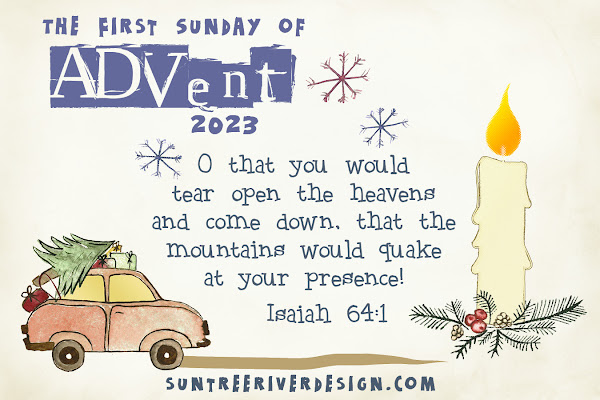by Alena Bugrova with legal reuse rights
Isaiah 64:1-9
1 O that you would tear open the heavens and come down, so that the mountains would quake at your presence – 2 as when fire kindles brushwood and the fire causes water to boil – to make your name known to your adversaries, so that the nations might tremble at your presence! 3 When you did awesome deeds that we did not expect, you came down, the mountains quaked at your presence.
4 From ages past no one has heard, no ear has perceived, no eye has seen any God besides you, who works for those who wait for him. 5 You meet those who gladly do right, those who remember you in your ways. But you were angry, and we sinned; because you hid yourself we transgressed. 6 We have all become like one who is unclean, and all our righteous deeds are like a filthy cloth. We all fade like a leaf, and our iniquities, like the wind, take us away. 7 There is no one who calls on your name, or attempts to take hold of you; for you have hidden your face from us, and have delivered us into the hand of our iniquity.
8 Yet, O Lord, you are our Father; we are the clay, and you are our potter; we are all the work of your hand. 9 Do not be exceedingly angry, O Lord, and do not remember iniquity forever. Now consider, we are all your people.
Advent Hope
With the first Sunday of Advent, the church begins a new year of grace as it waits for Jesus' birth. Advent means toward (ad) the coming (venire). Maybe you know esperar in Spanish means wait, hope, and expect? Advent is a harbinger of Easter when we celebrate hope's fulfillment.
Opening each window in your advent calendar reveals a mini-surprise that brings us closer to the gift of Jesus' birth, brings us nearer the day we'll give gifts and receive gifts. At church and at home, Advent wreaths are another sign of the season that's especially welcome in the northern hemisphere as we anticipate Jesus' lighting the world at the darkest time of year.
But calendars and candles are homespun and tame. They have become too familiar. Advent calls us to get to the root, literally to be radical.
Advent Apocalyptic
With calls to repentance and hope, Advent definitely is a season of waiting and watching. Every year's scripture readings open up Advent with a splash of apocalyptic, signaling the end of the world as we've known it—the end of death, destruction, empire, violence, exploitation. The end of despair and discouragement. The dawn of hope and possibility. Apocalyptic/ apocalypse means revealing or uncovering something that's hidden. Very broadly, apocalyptic is a type of writing that uses one concept to illustrate another and that needs to be responsibly interpreted.
We're now in Revised Common Lectionary (RCL) year B with Mark as the featured gospel; here's a short overview of Mark. I'm reflecting on the Hebrew bible passage, so here's Mark 13:24-37 the gospel reading for today. It's from the middle of Mark's passion narrative!
Today's First Reading
Today's Third Isaiah comes from back on home land in Jerusalem after the Babylonian exile. Along the way from Egypt through the promised land, into exile and back, the Israelites had lived some solid theology. Like us, in their heads they knew God could not be controlled by humans or confined to a small space. They already had experienced God as an extraordinary deity who heard the people, traveled alongside, and entered into unbreakable covenant them them. In their heads they knew God never would leave them. However, similar to our experiences, events had gone down in ways that made them wonder if God had disappeared.
This poetry is interesting because instead of characteristic prophetic content that addresses the people with inspired words from God, we hear the people speaking to God. Pleading with God. Begging God to remember! It's very much like the psalms! The Hebrew for "tear open" implies a rip or rupture that cannot be mended, and is similar to the Greek word used when the temple curtain tore at Jesus' death.
During Advent we wait for Jesus of Nazareth, the Christ of God, who obliterates divisions between earth and heaven. This Jesus heals creation's brokenness and prepares our future.
Memory and Hope
It often feels as if God has abandoned this planet. With the overall state of the world, egregious and targeted violence everywhere, climate degradation, social distancing and estrangement (in more than one sense), and psychological distress that has led almost everyone to seek some kind of solution for restoring their emotional and mental wellness, even people who routinely trust God, frequently sense God's presence, and pray a lot have serious doubts. This week's second lection from 1 Corinthians 1:7 says "we wait for the revealing [literally apocalypse] of our Lord Jesus Christ." In today's first reading the people beg for God's self-revelation and intervention because they have a history with this God. They remember. And they remind God.
Advent calendars and candles have become almost too familiar. Advent calls us to the root – to ground zero – of our lives together as people of God. We recreate our history with God in Word and Sacrament as we join with God's people in every place, every time. Worship and sacraments make those past events present to us right here and right now. As we re-member and re-enact the past, we trust God's future redemption and astonishing actions yet to come because we have lived solid theology with this God. Getting to the taproot of our lives together with God, we actually remember the future. We wait and watch and look for signs of God's tomorrows breaking into our midst.

No comments:
Post a Comment